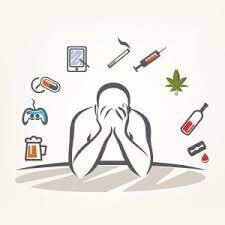Appointment
24 X 7 Hospital Timings

Substance use disorders (SUDs) are a group of conditions characterized by the compulsive use of drugs or alcohol despite negative consequences. SUDs can develop as a result of many factors, including environmental factors, and personal experiences. These disorders can also co-occur with other mental health conditions, such as anxiety, depression, or trauma.
The Diagnostic and Statistical Manual of Mental Disorders (DSM-5) identifies 11 classes of substances that can be involved in SUDs, including alcohol, tobacco, cannabis, opioids, stimulants, hallucinogens, and others. The severity of SUDs can range from mild to severe, and the criteria for diagnosis include impaired control over substance use, social impairment, risky use, tolerance, and withdrawal.
Alcohol use disorder (AUD) is the most common type of SUD, affecting millions of people worldwide. AUD can cause a wide range of physical and psychological problems, including liver disease, heart disease, depression, anxiety, and memory impairment. People with AUD often struggle with relationships, employment, and other areas of their lives due to their drinking.
Smoking addiction, or nicotine use disorder, is another common form of SUD. Nicotine addiction can lead to a variety of health problems, including lung cancer, heart disease, and respiratory issues. Quitting smoking can be challenging due to the addictive nature of nicotine, but there are many effective treatments available to help individuals quit.
Cannabis use disorder (CUD) involves the compulsive use of cannabis despite negative consequences. People with CUD may experience impaired cognitive function, memory loss, and increased risk of psychosis. The use of cannabis can also impact academic or work performance, personal relationships, and overall well-being.
Opioid use disorder (OUD) is a serious condition characterized by the compulsive use of opioids despite negative consequences. OUD can lead to physical and psychological dependence, withdrawal symptoms, and a high risk of overdose. Opioid addiction is a major public health crisis, and effective treatments are crucial to saving lives and preventing further harm.
Other substance use disorders can involve the use of prescription drugs, stimulants, and other substances. Regardless of the specific substance involved, SUDs can have devastating consequences on an individual's life, relationships, and overall health.
At our hospital, we offer comprehensive treatment programs for individuals struggling with addiction. Our team of experienced professionals includes psychiatrists, psychologists, therapists, and addiction specialists who work together to create personalized treatment plans tailored to each individual's needs.
Treatment for addiction typically involves a combination of medication-assisted treatment, behavioural therapy, and counselling. In addition to medication-assisted treatment, behavioural therapy and counselling are essential components of addiction treatment. Cognitive-behavioural therapy (CBT), motivational interviewing (MI), and contingency management are evidence-based therapeutic approaches used to treat addiction. These therapies help individuals identify triggers and develop coping mechanisms to prevent relapse.
Our addiction treatment programs also focus on addressing underlying mental health issues that may contribute to addiction, such as depression, anxiety, and trauma. We provide comprehensive care to ensure that all aspects of an individual's health are addressed during treatment.
It's important to note that SUDs are treatable, and seeking professional help is the first step toward recovery. At our hospital, we are committed to helping individuals achieve and maintain long-term recovery from addiction. Our programs provide the support, education, and resources necessary for individuals to build a foundation for a healthy, fulfilling life free from addiction.